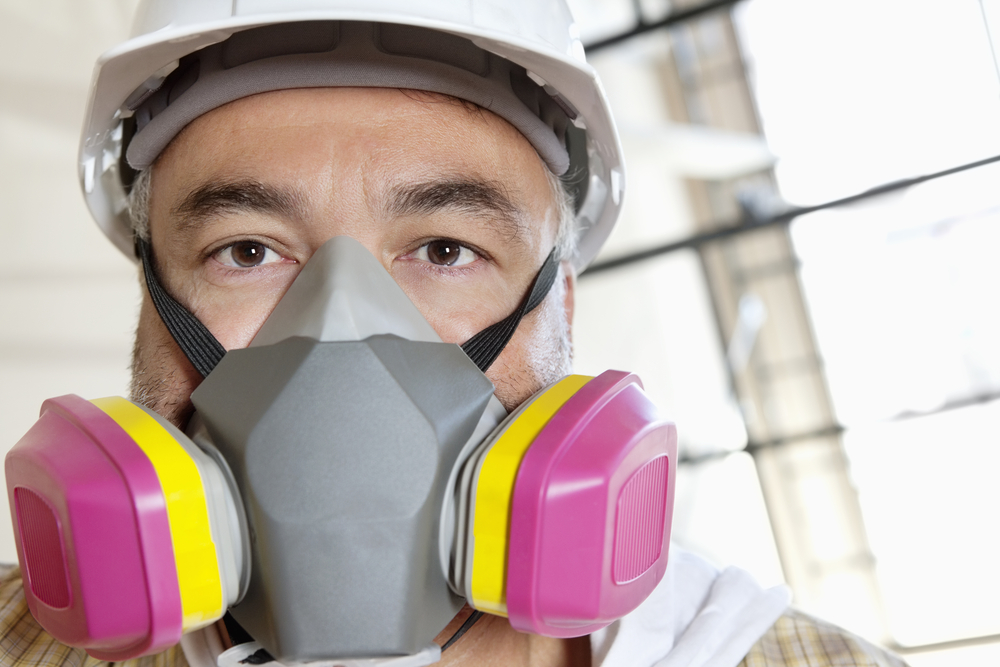Dust masks are an essential item of personal protective equipment (PPE), preventing workers from contracting potentially fatal occupational diseases. Choice of mask (or respirator) is actually a matter of life and death. Read on for what to consider when choosing the right mask.
Under UK law, masks must meet certain standards according to application. Disposable masks must adhere to standard EN 149:2001, for instance. And they must be marked accordingly.
Itʼs all in the fit
Finding a suitable mask is more than simply choosing one at your preferred price point, or because it carries a British Standard logo. Your two key considerations should be suitability for the working environment/task, and the physical fit for the wearer. This point is critical – if the mask does not create a seal around the wearer’s nose and mouth, it will leak. These gaps may be tiny, but so are the airborne particulates you are trying to protect against. If the mask doesn’t make an airtight seal, it isn’t fit for purpose.
Lethal assumptions
In the same way that hard hats need to be adjusted to the specific size of the wearer’s head, mask fit can vary widely between individuals. You cannot simply assume that one size fits all. Instead, you will need to test a range of masks to ensure you get the right fit. The variations in face shape are even more marked between men, women and people of different ethnicity. Diverse workforces will need to be particularly careful when specifying face masks.
Factors that determine mask fit
Facial shape will be the most important factor in determining fit, but there are other details that must be considered. Does the wearer have facial hair? Beards and moustaches can create gaps that break the seal. The same is true of marks and scars that raise the skin surface. Employees who are reliant on glasses or contact lenses will also warrant special consideration. Any mask that they wear will need to allow sufficient clearance to wear glasses without compromising the seal against the skin. Don’t forget that other PPE, such as helmets or ear defenders, could also affect mask fit. You should also take note of any existing health conditions like asthma or skin allergies. Employees with latex allergies may not be able to tolerate certain seals, for instance. Or those with breathing conditions may require specialist equipment to cope with any additional strain as they inhale.
Comfort is important
Although air seal is absolutely crucial, you should not underestimate the importance of comfort. Operatives may be expected to wear their masks for hours at a time, so the way the mask feels on their face should be considered. The HSE suggests that workers issued with tight-fitting masks should take a break every hour or so, helping to relieve any discomfort. When trialling new masks, ask workers to wear theirs for at least an hour to accurately gauge the comfort levels. If a mask has a great seal, but is too uncomfortable to wear, it will not be suitable for your needs. Don’t forget that environmental conditions like heat and humidity will also have an impact on comfort levels.
Face fit testing is not a one-off exercise
Because masks and respiratory protective equipment (RPE) are only as good as their seal, you (or the wearer) will need to conduct periodic face fit tests. These follow-up checks are important to see whether anything has changed since first fitting. Wearers should check their mask for damage every time the mask is put on. You should also arrange urgent retests when a worker grows or shaves a beard as the seal between mask and face will definitely be affected. Where sites operate a ‘no-hat, no-entry’ policy, you could consider adding mandatory mask fit tests to the mix. The dangers posed by inhaled particulates may take years to manifest, but the risks are as dangerous as being hit on the head by falling objects. The issue of RPE is so significant that you must seek professional advice if you are in any doubt at all about your operatives’ safety.
Get in touch for help and advice on choosing and fitting masks.
FIND OUT MORE
DAVID CANT
Veritas Consulting
www.veritas-consulting.co.uk


